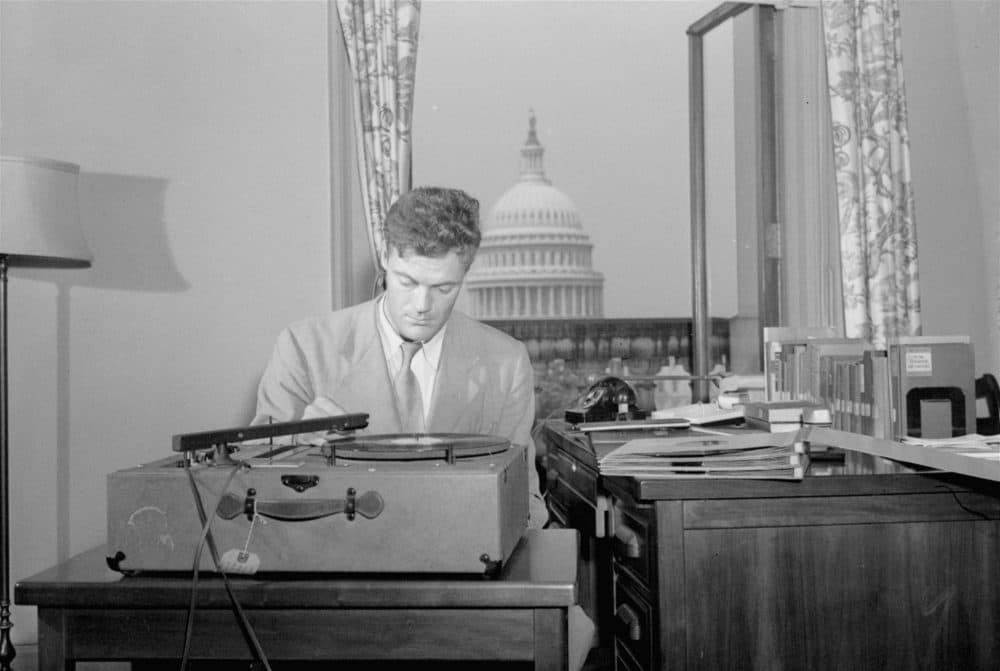Advertisement
The Brilliance And Mania Of Poet Robert Lowell
Resume
Robert Lowell died in 1977 at the age of 60. He was a towering figure — physically big — but most significantly, dominant in the world of letters. A two-time Pulitzer Prize winner, Lowell was America's most famous post-war poet. Born in Boston, many of his poems made reference to his deep New England roots.
Robert Lowell's poetry was wide-ranging, and dealt with both the personal and the epic. It spoke of friendship and death; Boston and Maine; the American Revolution and the Greek myths. And he wrote it all while suffering from extreme bipolar disorder.
Kay Redfield Jamison has written a new biography of Lowell that explores the relationship between his art and his illness. "Lowell handled a great deal of adversity, a great deal of suffering, and terror of going mad, always," she says. "And he did it with a remarkable amount of courage. No matter what happened to him, he remained courageous in the light of a great deal of darkness."
Jamison will be speaking about her book, "Robert Lowell, Setting the River on Fire: A Study of Genius, Mania, and Character," at the Nantucket Book Festival on Saturday, June 17 at 12:00.
Guest
Kay Redfield Jamison, professor of psychiatry at the Johns Hopkins University School of Medicine. Author of "Robert Lowell, Setting the River on Fire: A Study of Genius, Mania, and Character."
Interview Highlights
On why Jamison wanted to explore Lowell’s art and his illness
“I think he’s extraordinary and I wanted to do some justice to him, in that sense. Lowell handled a great deal of adversity, a great deal of suffering, and terror I think of going mad always. He did it with a remarkable amount of courage and no matter what happened to him he remained courageous in the light of a great deal of darkness.”
“When you have that kind of genius hit by that kind of fiery disinhibiting energizing reckless aspect of this illness, I think it loosens his thinking. One of the things I tried to write about was this mania hit this incredibly fertile man who lived in history, thought in history, thought in metaphor, being swept over by a force that rearranges, and changes, and speeds up and causes to really vault over the usual rules of grammar.”
On how “Setting the River On Fire” was not a metaphor to Lowell
“What is clear time and time again is his terror of becoming manic again. Which is true for anyone who’s been manic but particularly if you’ve been manic as often as Lowell was. I think that ‘setting fire’ was not a metaphor. These were things that were very real to him. He continued to take chances in his poetry and he continued to face down what I think in most people would be insurmountable demons.”
On how Lowell would behave when he was manic
“He did awful things. He was physically violent from time to time, he was cutting in his words. In some ways, those [words] had probably the most lasting effects on many of his friends. That he said things that were withering painful, caustic.”
“...He was unfaithful. One of the first signs of Lowell getting manic is he would become involved sexually [and] romantically with, usually, a young woman and declare to the world that he was going to divorce his wife and marry this person. Then, when he came down off the mania and became depressed, that all stopped and he went back to his marriage. But, he did everything he could do to express remorse and continue to live and face the next day.”
On the connection between bipolar disorder and creativity and intellectual energy
“Mania is an addictive state. It’s hugely powerful and, in maybe half of the people that get manic, it’s usually enjoyable on the way up for a while before it becomes a total nightmare. In those early phases, for a lot of people, your ideas come much more quickly. You feel the importance of the ideas, [...] you want to share the idea, you want to convey it, you want to communicate it.”
“...But, the next mountain over, you find that actually this is not quite the brilliant thing you thought it was [...] And so that’s true with one's ideas but it’s also true that some of those ideas you can rope in and develop and do something with.”
On whether Lowell’s mental illness propelled his poetry
“Everyone who knew Lowell thought he was a genius and uniquely so. These were people who did not give out that title easily. He had an incredibly three dimensional chess playing mind and remarkable poetry. I think his poetry is staggeringly original. And just it came across the American scene in literature and just transformed it and I don’t think you see that very often. One of the many wonderful things about Lowell is that combination of genius and how he took the disease that brought him to his knees and used it. But then brought this enormous will and willpower and discipline and courage to both writing and living.”
This segment aired on June 16, 2017.